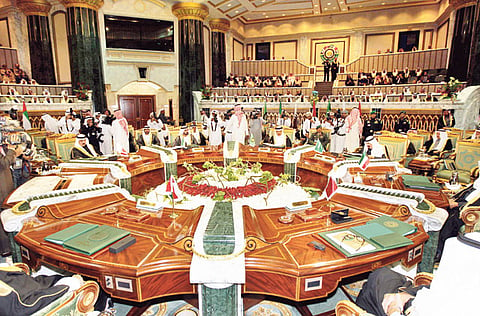Saudi Arabia calls for Gulf ‘union’
Abdullah opens summit with a proposal to set up strong entity to meet challenges

Dubai: In a surprise move, King Abdullah Bin Abdul Aziz of Saudi Arabia told fellow Gulf leaders who are meeting in Riyadh to establish a Gulf Union to take on "the challenges that threaten our nations, security and stability."
"I ask you today to move from a stage of cooperation to a stage of union in a single entity," Abdullah said at the opening session of a Gulf Cooperation Council (GCC) summit yesterday. He warned the bloc's security was being targeted, without elaborating.
His Highness Shaikh Mohammad Bin Rashid Al Maktoum, Vice-President and Prime Minister of the UAE and Ruler of Dubai, led the UAE delegation.
The two-day summit will focus on several issues, including the security collaboration among the member states in the face of increasing Iranian threats and the fears of a growing Iranian military presence in Iraq after this week's US withdrawal from Iraq.
"Iranian threats to the GCC will be tackled," Abdul Aziz Bin Saqr, President of the Gulf Research Centre told Gulf News.
"There must be a clear GCC response to Iranian threats," he said.
Internal affairs
Arab Gulf countries have repeatedly accused Iran of interferring in their internal affairs, especially in Bahrain, Kuwait and the eastern province of Saudi Arabia, where there is a noticeable Shiite population — a charge Iran has denied.
Tehran, on the other hand, has criticised the way the Gulf governments handled the protests of its Shiite citizens. It also threatened to close the Strait of Hormuz and hinder the maritime movement across the strategic passage.
The GCC summit, which is the first since the wave of revolutions swept the Arab region late last year, is expected to discuss the military and security cooperation, some press reports said.
"There is a clear opportunity for Iran to increase its intelligence and military presence in Iraq to fill the security vacuum created by the withdrawal of US troops," Saqr said.
"Also, armed militants in Iraq constitute a major threat to Saudi Arabia and Kuwait, who share a border with Iraq," he added.
The summit comes as the embattled regime of Syria, rocked by a nine-month uprising the UN estimates has killed at least 5,000 people, agreed to an Arab League proposal to send observers to the country. In addition to Syria, the Gulf leaders will discuss the situation in Tunisia, Egypt and Libya, where popular uprisings have already unseated entrenched dictators this year.
As for GCC neighbour Yemen, which has always struggled with violence and poverty, the GCC is expected to provide a financial aid package, particularly since the situation has deteriorated following the unrest against Yemeni President Ali Abdullah Saleh which began in February.
GCC states, according to the Yemeni Foreign Minister Abu Bakr Al Kurbi, will support Yemen financially in its efforts to achieve political stability.


